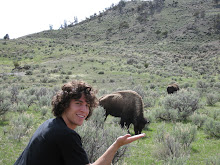Down to business. 'Numbers' is by no means as dry as the title suggests. In fact, my favorite biblical story thus far takes place in Numbers 22.22, Balaam, the Donkey, and the Angel. In short, some surprisingly pleasant author slipped in an Aesop's Fable halfway through Numbers 22. Balaam, who we learn is an unknown prophet who converses with god as easily as does Moses, is riding his donkey to Moab when his donkey sees an angel with a drawn sword in the middle of the road. The donkey veers from the road and is struck by Balaam so that it turns back to the road. Again the donkey tries to escape from the angel and again Balaam strikes the animal. This happens a third time until finally, it lays down under Balaam.

Then the Lord opened the mouth of the donkey and it said to Balaam, "what have I done to you, that you have struck me these three times?" Balaam said to the donkey, "Because you have made a fool of me! I wish I had a sword in my hand! I would kill you right now!" But the donkey said to Balaam, "Am I not your donkey, which you have ridden all your life to this day? Have I been in the habit of treating you this way?" And he said, "No."
Then the Lord opened the eyes of Balaam, and he waw the angel of the Lord standing in the road, with his drawn sword in his hand; and he bowed down, falling on his face. The angel of the Lord said to him, "Why have you struck your donkey these three times? I have come out as an adversary, because your way is perverse before me. The donkey saw me, and turned away from me these three times. If it had not turned away from me, surely just now I would have killed you and let it live."
What moral are we to take from this? According to the all knowing textual critics at wikipedia, the entire episode is designed to mock Balaam. But maybe it is a deeper message concerning the sin of assumption. Balaam assumed his donkey was misbehaving and in response he punished the animal. If he had taken the time to examine his donkey's past and see that this behavior was out of the ordinary, Balaam would not have made an 'ass' (so funny) out of himself and beat the donkey for saving his life.
In addition to this tale, an actual Book of Balaam text was found in Deir Alla, Jordan in 1967. Check out this link
http://www.christiananswers.net/q-abr/abr-a014.html

